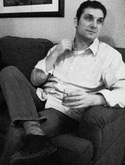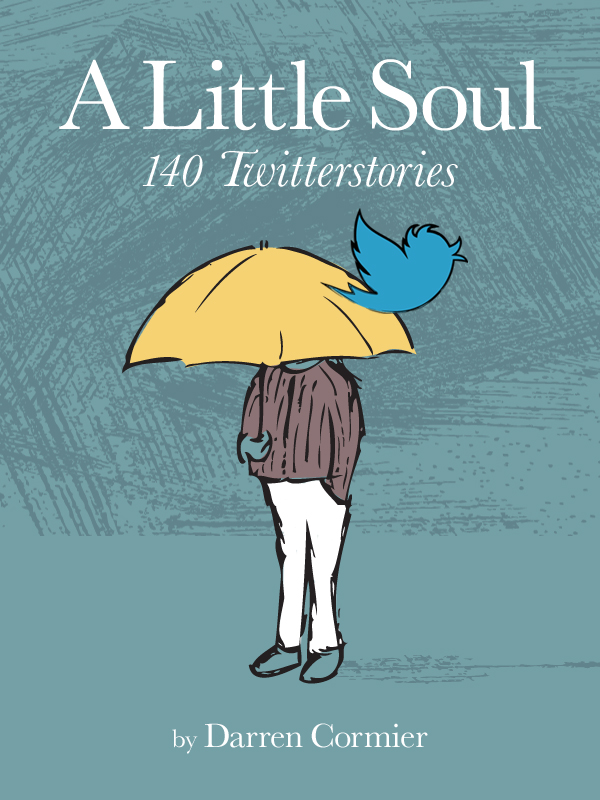When I was twelve years old, I was visiting my grandparents in Florida. Across the street were tennis courts and a tennis practice wall. One afternoon while arduously practicing backhands with no improvement, a photographer for the local newspaper took a series of pictures of me. One of these was published in the newspaper the next day. Instead of saying anything about it when I got back to the house, I instead waited. The next day I asked where the newspaper was. I found the photo, asked for a pair of scissors, and finally talked about what happened after they asked what the scissors were for and why I was cutting up that day's newspaper. Telling people about this really cool thing that happened to me--even my own family--was extremely uncomfortable.
Fast-forward twenty-something years and I find myself in the unenviable position of trying to promote myself and my burgeoning writing career.
In February, I was very fortunate to win an award for a short story I wrote: "Opus No. 1." Along with winning the award came publication in the university's literary magazine, Amoskeag, a journal of growing literary esteem and reputation. Earlier last week, the president of the university wrote a review of the magazine on his blog.
And now I yet again find myself in the uncomfortable position of self-promotion. I have attached the link and embedded the text below of the president's review. I will post this link on my Facebook page, directing people to this website and blog post. I will also post the link to this entry, and possibly to the review, and will also post the link to my twitter feed. I will do this with a sense of obligation, but not excitement. Self-promotion may be necessary, but I'm not comfortable with it. I'd rather watch reruns of Scrubs.
Amoskeag
I just finished reading the new issue of Amoskeag while on my flight to Chicago last night. To put it simply: it’s fabulous. The journal just keeps getting better and better and this issue assembles contributors from around the country, many of them quite accomplished, others just starting their careers.
Darren Cormier, one of our MFA students, has a lovely story called Opus No. 1. The circumstances of an adult son coming home to care for his dying father and confront his own failings and trauma was tender and beautifully wrought. That complicated and often painful time when the parent becomes child again and roles are reversed is something most of us will undergo and Cormier makes it sad and sweet and reminded me that the very frail and diminished people we often encounter in their old age were once vital and accomplished and, when in our families, often the shaping forces in our lives. I was moved.
Ann Hood’s Long Beautiful Hair takes a turn that is like a punch in the gut — I had to stop reading for a moment. It is a story that packs so much into so few words. Just masterful. It also holds out the possibility of recovery and redemption and rebuilding a life after even the most unimaginable of griefs.
Our own Diane Les Becquets provides a scene that is wholly original in her story Wild Spaces and I’m dying to ask her if it based on her own experiences, though I’ve always believed that one should not ask artists those sorts of questions. It feels almost indecent and irrelevant to the power of the art. But…..if you want to ask her and she tells you, let me know what you find out. We are so lucky to have a writer of this caliber leading our Creative Writing major.
I have a soft spot in my heart for poetry, the least appreciated of the arts in America. The ability to condense so much meaning and power in so very few words, to raise questions and simple delight in the structure of a couple of lines is a gift. I love Alexis Ivy’s last lines of her poem Unhearing:
Untimid, I would speak
but I don’t
understand hands.
Read the whole short poem and those lines will make sense. Julie Paige’s Beige is funny and wistful and just terrific. There are two hour movies that fall short of capturing the complexity and confusion and mystery of relstionships in the way Paul Hostovsky does in Open. Ah, to write like that!
I could go on. When people like Bob Begeibing and Bob Seidman and others started the journal so many years ago, could they have imagined what it has become today? In my last post I wrote about the intellectual and cultural landscape of the university. Amoskeag stands out as an absolute highlight within that context that is bringing SNHU national recognition.
 RSS Feed
RSS Feed

